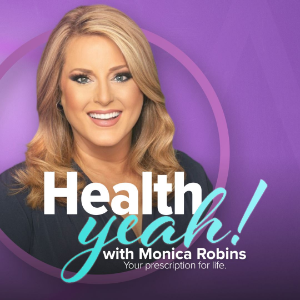
Health Yeah! With Monica Robins
Health & Wellness Podcasts
Health Yeah! with Monica Robins The health questions you're dying to ask but too embarrassed to say out loud? Monica asks them for you. From WKYC studios in Cleveland, veteran health correspondent Monica Robins breaks through the awkward silence surrounding your most pressing health concerns. No topic is off-limits. No question too uncomfortable. What you'll get: - Real talk with leading medical experts who aren't afraid to get specific - Answers to the health questions that keep you up at night googling symptoms - Honest conversations about the taboo topics other shows won't touch - Raw, unfiltered discussions that treat you like the informed adult you are Monica's been Cleveland's trusted health voice at 3News for three decades, and now she's bringing that same fearless curiosity to conversations that matter. Whether it's the symptoms you're too mortified to mention, the procedures you're terrified to research, or the wellness trends you're not sure you should trust—she's got you covered. Your health deserves straight answers. Monica delivers them. --- Monica Robins is not a medical doctor. All content is for informational purposes only and should not replace professional medical advice. Always consult your healthcare provider for medical information.
Location:
United States
Genres:
Health & Wellness Podcasts
Description:
Health Yeah! with Monica Robins The health questions you're dying to ask but too embarrassed to say out loud? Monica asks them for you. From WKYC studios in Cleveland, veteran health correspondent Monica Robins breaks through the awkward silence surrounding your most pressing health concerns. No topic is off-limits. No question too uncomfortable. What you'll get: - Real talk with leading medical experts who aren't afraid to get specific - Answers to the health questions that keep you up at night googling symptoms - Honest conversations about the taboo topics other shows won't touch - Raw, unfiltered discussions that treat you like the informed adult you are Monica's been Cleveland's trusted health voice at 3News for three decades, and now she's bringing that same fearless curiosity to conversations that matter. Whether it's the symptoms you're too mortified to mention, the procedures you're terrified to research, or the wellness trends you're not sure you should trust—she's got you covered. Your health deserves straight answers. Monica delivers them. --- Monica Robins is not a medical doctor. All content is for informational purposes only and should not replace professional medical advice. Always consult your healthcare provider for medical information.
Twitter:
@monicarobins
Language:
English
Contact:
4405544744
Website:
https://www.wkyc.com/
Email:
monicarobins@wkyc.com
What's the future of Medical research with all the federal cuts?
Duration:00:17:37
How NFL's Medical teams prepare for games overseas
Duration:00:10:18
Minority men face unique health challenges but help is available
Duration:00:12:31
Psychedelic science: How LSD could reshape anxiety treatment
Duration:00:14:40
Water Safety Tips Every Family Should Know
Duration:00:17:11
Summer Health and Safety: Protecting Yourself from Heat, Medications, and Hidden Dangers
Duration:00:18:04
Understanding Brain Aneurysms Before It's Too Late
Duration:00:19:01
Surprising Medical Renaissance of Psychedelics
Duration:00:27:40
Boost Immunity Naturally
Duration:00:22:51
Vaccines explained from infectious disease expert
Duration:00:25:32
K-Clarity: Exploring Ketamine's Therapeutic Frontiers
Duration:00:19:49
Latest on Long Covid
Duration:00:22:34
Back to School Wellness
Duration:00:17:10
Hope on the horizon for Lupus
Duration:00:19:44
Why the Supreme Court caused more vasectomies
Duration:00:18:45
Let's talk about sex
Duration:00:21:22
Back to School: Kids, sports and mental health
Duration:00:19:32
Why aren't you talking to your doctor about your brain?
Duration:00:21:41
The "Go" to guide to constipation
Duration:00:19:15
Mental health is part of sports training
Duration:00:26:58